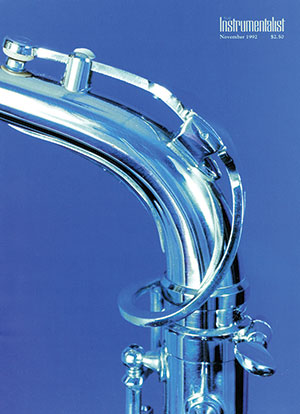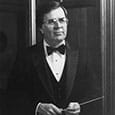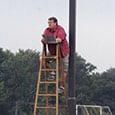
I expected to have another year before becoming a band parent. When my stepson came home with a flyer announcing a chance for 4th and 5th graders to try instruments, I knew that the future had come early. In the days before the tryout I received various bits of advice.
“Don’t let him pick the baritone. It is a pain for a young child to carry.”
“Consider the clarinet as it will be easy to double later on saxophone.”
“They won’t let him pick drums without keyboard experience.”
Because I started on trombone in 5th grade and continued for many years, I knew I could help him the most on a brass instrument. However, I concluded that students are more likely to thrive on instruments that excite them. I spent a half hour on the night before the tryout playing YouTube videos of outstanding recordings on each instrument. As we finished, I told my son to try the instruments he really liked, knowing that every director makes strategic choices to achieve balanced instrumentation. I expected that he would try saxophone and drums the next day. “Don’t let anybody push you around on this,” I urged him.
When Eliott came home from school the next day, he was clutching the instrument preference sheet from his director. There was a big star drawn next to Alto Saxophone. When describing his first saxophone note, he exclaimed, “It wasn’t that hard.” His attempt to play the trumpet was less successful. As it turned out, he never touched a drum stick at all.
The next day, he called me three times at work to see if I had signed him up for band and rented an instrument. When I confirmed that the contract was signed and the rental fees paid, there was extended, excited screaming on the other end of the call.
A week later, Eliott raced home from school and proudly put together his instrument. As he performed for unwitting neighbors on our quiet street, I decided that he made the right choice. Although his first notes were raw, I could imagine what progress might sound like in a few months. Unlike the droning that marks some early brass playing, Eliott’s saxophone sounded like a saxophone. He took his new instrument so seriously that he refused let anyone else carry it that night.
As I pondered helping Eliott on saxophone, I knew my brass knowledge was insufficient for the task. I was reminded of Anthony Pursell’s charming article in the March issue about learning bassoon from his 5th-grade son. As Pursell recalls, “Even as a music educator, my first reaction was a bit reserved….During my undergraduate years I took all of the methods classes required for music education majors, but I was never required to learn bassoon because of a shortage of available instruments. Needless to say, I was concerned that I might not be able to assist my son as I initially hoped to do.”
As happens with so many problems I face in parenting, I decided to start reading. I picked up our old First Lessons on Each Instrument book and flipped to the saxophone section co-written by Frederick Hemke, the legendary saxophonist and educator who taught for decades at Northwestern and passed away in April. He left a glittering legacy through hundreds of former students who became distinguished educators and performers, and I figured he could give a clueless trombonist some help.
I quickly learned that an overly long neck strap might look cool but can lead to pain. “The purpose of the neck strap is to hold the instrument directly in front of the mouth so it can be played with little pressure on the bottom lip.”
I also was reminded that young players can struggle to put the right amount of mouthpiece in their mouths. “Beginning sax students are usually not told how much mouthpiece to put into their mouths and end up with too much or too little. With too little mouthpiece in the mouth it is hard to make a sound; with too much, a honking sound ensues. The object is to find the point where the reed breaks away from the mouthpiece.”
Although learning about alto sax is a new world for Eliott and me, I have subtly tried to shape his musical taste throughout his young life. In the last few months, I have used an iPod Touch as one tool. I can add songs to my iTunes library while he is off at school, and they are ready to go on his device when he gets off the school bus.
One day I purchased Frederick Hemke’s album, Simple Gifts. That night, I explained to Eliott that Hemke had lived in the same town as us for many years. I told him, “You must always have an idea of the beautiful sound you want to make with your saxophone. This recording sounds like music from heaven.”
Eliott has a long way to go on his musical journey and will quickly eclipse my limited saxophone knowledge. However, after four years of slogging through Common Core math together (“Show your answer as an array and a picture”), we have finally reached one of the best parts of grade school. Beginning band arrived right on time after all.
– James M. Rohner
Publisher





